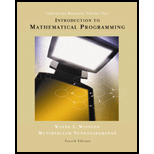
Introduction to mathematical programming
4th Edition
ISBN: 9780534359645
Author: Jeffrey B. Goldberg
Publisher: Cengage Learning
expand_more
expand_more
format_list_bulleted
Concept explainers
Expert Solution & Answer
Chapter 4, Problem 5RP
Explanation of Solution
Optimal solution:
- Consider the following linear programing problem:
- min z= -x1-2x2
- Subject to the constraints:
- 2x1+x2 ≤ 5
- x1+x2 ≤ 3
- x1,x2 ≥ 0
- Convert the minimization into maximization, then the result is:
- max z = -min(-z)
- max z = -min z*
- Therefore, the objective function is, max z* = x1+2x2
- Consider s1 and s2 are the two slack variables.
- Add each of the slack variables to each constraint when they are less than or equal to type.
- Here, the given two constraints are less than or equal to type, then these two slack variables are added to make it as standard form and at the same time add these variables to the objective function with 0 quantity weight.
- Therefore, the standard form of the LP is as follows:
- min z= -x1-2x2-0×s2
- Subject to the constraints:
- 2x1+x2 +s1= 5
- x1+x2+s2 = 3
- The matrix form is as follows:
- max z*=cX
- Subject to the constraints:
- AX=b
- The initial simplex table is shown below:
- In the initial simplex table, the first row is filled with objective function coefficients, second and third columns are filled with matrix A values.
- Basic variable column is filled with matrix b...
Expert Solution & Answer
Want to see the full answer?
Check out a sample textbook solution
Students have asked these similar questions
Solve the following LP optimization problem using the simplex method: maximize 40x + 30 subject to x + y <= 12, 2x + y <= 16 x >= 1 , y >= 0
Use the Simplex approach to solve the following LP problem:
Maximize z = 3 X1 + X2
Subject to: 2 X1 + 4X2 < 6
5 X1 + 10X2 < 25
− 1 X1 > − 2
2 X2 ≤ 4
and X1, X2 > 0.
Chapter 4 Solutions
Introduction to mathematical programming
Ch. 4.1 - Prob. 1PCh. 4.1 - Prob. 2PCh. 4.1 - Prob. 3PCh. 4.4 - Prob. 1PCh. 4.4 - Prob. 2PCh. 4.4 - Prob. 3PCh. 4.4 - Prob. 4PCh. 4.4 - Prob. 5PCh. 4.4 - Prob. 6PCh. 4.4 - Prob. 7P
Ch. 4.5 - Prob. 1PCh. 4.5 - Prob. 2PCh. 4.5 - Prob. 3PCh. 4.5 - Prob. 4PCh. 4.5 - Prob. 5PCh. 4.5 - Prob. 6PCh. 4.5 - Prob. 7PCh. 4.6 - Prob. 1PCh. 4.6 - Prob. 2PCh. 4.6 - Prob. 3PCh. 4.6 - Prob. 4PCh. 4.7 - Prob. 1PCh. 4.7 - Prob. 2PCh. 4.7 - Prob. 3PCh. 4.7 - Prob. 4PCh. 4.7 - Prob. 5PCh. 4.7 - Prob. 6PCh. 4.7 - Prob. 7PCh. 4.7 - Prob. 8PCh. 4.7 - Prob. 9PCh. 4.8 - Prob. 1PCh. 4.8 - Prob. 2PCh. 4.8 - Prob. 3PCh. 4.8 - Prob. 4PCh. 4.8 - Prob. 5PCh. 4.8 - Prob. 6PCh. 4.10 - Prob. 1PCh. 4.10 - Prob. 2PCh. 4.10 - Prob. 3PCh. 4.10 - Prob. 4PCh. 4.10 - Prob. 5PCh. 4.11 - Prob. 1PCh. 4.11 - Prob. 2PCh. 4.11 - Prob. 3PCh. 4.11 - Prob. 4PCh. 4.11 - Prob. 5PCh. 4.11 - Prob. 6PCh. 4.12 - Prob. 1PCh. 4.12 - Prob. 2PCh. 4.12 - Prob. 3PCh. 4.12 - Prob. 4PCh. 4.12 - Prob. 5PCh. 4.12 - Prob. 6PCh. 4.13 - Prob. 2PCh. 4.14 - Prob. 1PCh. 4.14 - Prob. 2PCh. 4.14 - Prob. 3PCh. 4.14 - Prob. 4PCh. 4.14 - Prob. 5PCh. 4.14 - Prob. 6PCh. 4.14 - Prob. 7PCh. 4.16 - Prob. 1PCh. 4.16 - Prob. 2PCh. 4.16 - Prob. 3PCh. 4.16 - Prob. 5PCh. 4.16 - Prob. 7PCh. 4.16 - Prob. 8PCh. 4.16 - Prob. 9PCh. 4.16 - Prob. 10PCh. 4.16 - Prob. 11PCh. 4.16 - Prob. 12PCh. 4.16 - Prob. 13PCh. 4.16 - Prob. 14PCh. 4.17 - Prob. 1PCh. 4.17 - Prob. 2PCh. 4.17 - Prob. 3PCh. 4.17 - Prob. 4PCh. 4.17 - Prob. 5PCh. 4.17 - Prob. 7PCh. 4.17 - Prob. 8PCh. 4 - Prob. 1RPCh. 4 - Prob. 2RPCh. 4 - Prob. 3RPCh. 4 - Prob. 4RPCh. 4 - Prob. 5RPCh. 4 - Prob. 6RPCh. 4 - Prob. 7RPCh. 4 - Prob. 8RPCh. 4 - Prob. 9RPCh. 4 - Prob. 10RPCh. 4 - Prob. 12RPCh. 4 - Prob. 13RPCh. 4 - Prob. 14RPCh. 4 - Prob. 16RPCh. 4 - Prob. 17RPCh. 4 - Prob. 18RPCh. 4 - Prob. 19RPCh. 4 - Prob. 20RPCh. 4 - Prob. 21RPCh. 4 - Prob. 22RPCh. 4 - Prob. 23RPCh. 4 - Prob. 24RPCh. 4 - Prob. 26RPCh. 4 - Prob. 27RPCh. 4 - Prob. 28RP
Knowledge Booster
Learn more about
Need a deep-dive on the concept behind this application? Look no further. Learn more about this topic, computer-science and related others by exploring similar questions and additional content below.Recommended textbooks for you
 Operations Research : Applications and AlgorithmsComputer ScienceISBN:9780534380588Author:Wayne L. WinstonPublisher:Brooks Cole
Operations Research : Applications and AlgorithmsComputer ScienceISBN:9780534380588Author:Wayne L. WinstonPublisher:Brooks Cole

Operations Research : Applications and Algorithms
Computer Science
ISBN:9780534380588
Author:Wayne L. Winston
Publisher:Brooks Cole